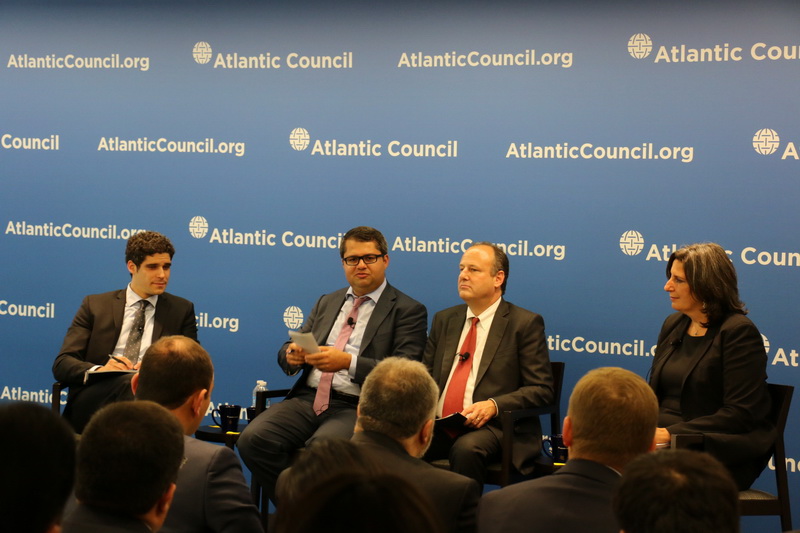Washington-based think-thank hails Azerbaijan’s role as NATO partner

By Sara Rajabova
Azerbaijan's position as an important partner of the NATO was highlighted in Washington.
One of the influential analytical centers in the U.S., the Washington-based Atlantic Council hosted an event titled: "NATO in the Caucasus: Example of Azerbaijan."
The event coincided with the 20th anniversary of Azerbaijan's joining to the NATO Partnership for Peace program.
Addressing the event, Atlantic Council President, Frederick Kempe noted that as an important partner of the NATO, Azerbaijan has gained continuous attention, Azerbaijani embassy in the U.S. said.
Other speakers of the event included Azerbaijani Ambassador to NATO, Khazar Ibrahim, Deputy Assistant Secretary from the Bureau of European and Eurasian Affairs of the U.S. Department of State, Eric Rubin, Visiting Researcher at Center for Eurasian, Russian and East European Studies of Georgetown University, Brenda Shaffer.
The NATO and Azerbaijan are actively cooperating on democratic, institutional, and military reforms, and enjoy practical cooperation in various areas.
The cooperation plan between Azerbaijan and the NATO is set out in the Individual Partnership Action Plan (IPAP) on Azerbaijan.
Azerbaijan is seeking to achieve Euro-Atlantic standards and get closer to Euro-Atlantic institutions. In this regard, supporting some reforms in the security sector and establishing democratic institutions are the key elements of the NATO-Azerbaijan cooperation.
Referring to the 20 years' history of the NATO-Azerbaijan relations, Ibrahim said these relations have been developing and taking a strategic character, after Azerbaijani President Ilham Aliyev's last visit to the NATO Headquarters.
He noted that during those years, Azerbaijan, who received assistance from NATO, turned to a country that contributes to different activities of the organization.
Ibrahim also spoke about Azerbaijan's support in various operations in Afghanistan.
He pointed out the unequivocal support to Azerbaijan's territorial integrity and sovereignty in the final documents of the latest NATO summits.
Addressing the event, Rubin said Azerbaijan's participation in the NATO Partnership for Peace Program had "very impressive" effects, praising this relation as a "successful story".
He also noted Azerbaijan's important position in Northern Distribution Network (NDN), ensuring communication with Afghanistan and hailed country's role in cooperation in this field.
Presently, Azerbaijan supports the international peace keeping operations in Afghanistan. Currently, some 90 Azerbaijani servicemen are serving as part of international forces securing safety in Afghanistan (The International Security Assistance Force (ISAF)).
Azerbaijan is also among the eight partner countries that have confirmed their presence in Afghanistan after 2014. Peacekeepers of the country will stay in Afghanistan after the withdrawal of U.S. troops from the country by the end of 2014. However, Azerbaijan will reduce its presence in Afghanistan after 2014.
Shaffer, in turn, spoke about the problems and threats that Azerbaijan faces in the region. Hailing Azerbaijan's cooperation with the NATO in the field of security, she said the oil-rich country contributes to the European energy security.
She noted that current conflict in the South Caucasus region negatively impacts the regional processes.
Shaffer spoke in favor of active participation of the U.S. in the settlement of the Armenian-Azerbaijani Nagorno-Karabakh conflict, which erupted back in 1988 over Armenia's territorial claims against Azerbaijan.
Armenia occupied over 20 percent of Azerbaijan's internationally recognized territory, including Nagorno-Karabakh and seven adjacent regions, after laying territorial claims against its South Caucasus neighbor that caused a brutal war in the early 1990s. Long-standing efforts by U.S, Russian and French mediators have been largely fruitless so far.
Here we are to serve you with news right now. It does not cost much, but worth your attention.
Choose to support open, independent, quality journalism and subscribe on a monthly basis.
By subscribing to our online newspaper, you can have full digital access to all news, analysis, and much more.
You can also follow AzerNEWS on Twitter @AzerNewsAz or Facebook @AzerNewsNewspaper
Thank you!
